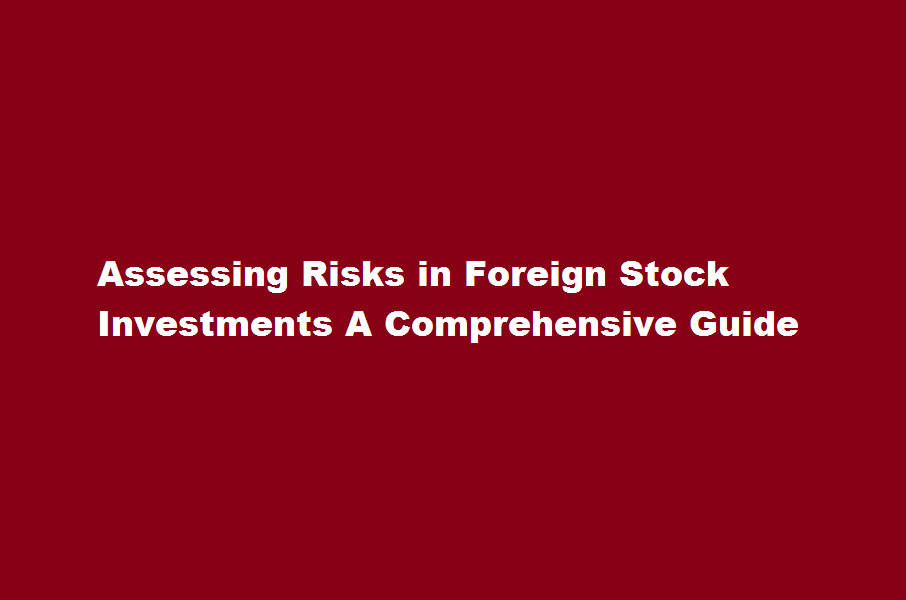Assessing Risks in Foreign Stock Investments A Comprehensive Guide
4 min read
Introduction
Investing in foreign stocks can offer opportunities for diversification and potential returns. However, it is essential to assess and manage the risks associated with international investments. This article provides a comprehensive guide on how to assess the risks involved in investing in foreign stocks. By understanding factors such as currency risk, political and regulatory risks, economic instability, and market volatility, investors can make informed decisions and mitigate potential pitfalls.
Currency Risk
Currency risk is one of the primary risks associated with investing in foreign stocks. Fluctuations in exchange rates can significantly impact investment returns. Consider the following factors
- Exchange Rate Volatility Currency values can fluctuate due to various economic and geopolitical factors. Understanding historical volatility and potential future trends in exchange rates is crucial for assessing currency risk.
- Translation Risk When converting foreign investment returns back into the investor’s home currency, adverse currency movements can lead to reduced returns. Evaluating the potential impact of translation risk on investment performance is important.
- Economic Factors Factors such as interest rate differentials, inflation rates, and economic indicators in both the investor’s home country and the foreign country can influence currency values. Assessing economic conditions is vital for understanding currency risk.
Political and Regulatory Risks
Political and regulatory risks refer to the uncertainties arising from the political stability and regulatory environment of the foreign country. Consider the following aspects
- Political Stability Assess the political landscape of the foreign country, including the stability of its government, potential for political unrest, and the impact on economic policies and market conditions.
- Regulatory Environment Understand the regulatory framework governing the foreign market and the specific regulations impacting the industry in which the foreign company operates. Regulatory changes can affect business operations and investment returns.
- Legal and Governance Risks Evaluate the strength of legal systems, property rights, contract enforceability, and corporate governance standards in the foreign country. Weak legal systems or inadequate governance practices can increase investment risks.
Economic Instability
Economic instability in a foreign country can pose risks to investments in its stocks. Consider the following factors
- GDP Growth and Economic Indicators Evaluate the country’s GDP growth rates, inflation levels, unemployment rates, and other economic indicators. Strong economic fundamentals generally support business growth and stock performance.
- Fiscal and Monetary Policy Understand the fiscal policies, government debt levels, and monetary policies of the foreign country. Assess the potential impact on interest rates, inflation, and overall economic stability.
- Country-Specific Risks Consider country-specific risks such as financial crises, currency devaluations, economic recessions, and geopolitical tensions. These risks can significantly impact the performance of foreign stocks.
Market Volatility
Market volatility refers to the fluctuations in stock prices and overall market conditions. Consider the following aspects
- Liquidity Assess the liquidity of the foreign stock market and individual stocks. Low liquidity can increase trading costs and potentially limit the ability to buy or sell shares at desired prices.
- Volatility Measures Evaluate historical volatility and average trading volumes of foreign stocks. Higher volatility may indicate increased investment risk and potential price swings.
- Market Efficiency Consider the efficiency and transparency of the foreign stock market. Efficient markets with robust regulations and access to timely information can enhance investor confidence.
Frequently Asked Questions
How can I manage currency risk when investing in foreign stocks?
To manage currency risk, investors can consider hedging strategies such as using currency futures, options, or exchange-traded funds (ETFs) that provide exposure to foreign currencies. Consult with a financial advisor to determine the most suitable hedging approach.
What steps can I take to mitigate political and regulatory risks?
Diversifying investments across multiple countries, conducting thorough research on political stability, understanding local regulations, and staying updated on geopolitical developments can help mitigate political and regulatory risks.
How can I stay informed about economic instability in foreign countries?
Regularly monitor economic indicators, financial news, and reports from reputable sources. Utilize economic data platforms and consult with local experts or financial advisors familiar with the foreign country’s economic landscape.
Diversification across different sectors and regions, setting realistic investment goals, maintaining a long-term perspective, and regularly reviewing and rebalancing portfolios can help mitigate the impact of market volatility.
Should I consult with a financial advisor when assessing risks in foreign stock investments?
Consulting with a qualified financial advisor can provide valuable insights and expertise in assessing risks associated with foreign stock investments. They can help analyze specific risks, tailor risk management strategies, and align investments with individual goals and risk tolerance.
Conclusion
Assessing the risks associated with investing in foreign stocks is crucial for making informed decisions and managing potential pitfalls. By considering factors such as currency risk, political and regulatory risks, economic instability, and market volatility, investors can develop effective risk management strategies. Conducting thorough research, staying informed, and seeking professional guidance can help navigate the complexities of international investments and enhance the chances of achieving long-term investment success.
Read Also : Understanding The Impact of Currency Fluctuations on Foreign Stocks






